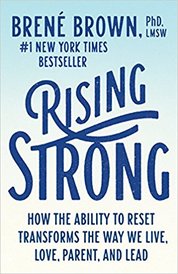The Counselor's Bookshelf:
|
 Full disclosure, I haven't finished this book yet. I'm only on page 87 but I read something on page 68 that I thought was awesome and I want to share it now. For those of you who aren't familiar with Brené Brown and her work, I recommend checking her out. Click HERE and HERE and HERE. Brené writes, "What I've learned from the research and tried to put into practice in my own life sounds way simpler than it is: Give yourself permission to feel emotion, get curious about it, pay attention to it, and practice. This work takes practice. Awkward, uncomfortable practice." She goes on to describe how she actually writes permission slips for emotions and puts them in her pocket to carry into a meeting, or event, or new situation. So let's think about this for a minute. What if we could give ourselves permission to feel what we're feeling at any given moment? I give myself permission to feel nervous about giving a presentation. I give myself permission to feel angry about a decision a co-worker makes. I feel guilty about saying no to a friend. Permission granted. I feel anxious for no reason at all. Permission granted. This doesn't mean we act on those feelings. It doesn't mean we are right and someone else is wrong. It doesn't mean those feelings make sense. It just means that in any given moment, the way we are, what we're feeling, is OK. Acceptable. Respectable. Once the permission slip is granted and we are able to allow what we're feeling to be what we're feeling, then we need to use our skills to figure out what to do about it. This is where some deep breaths, writing it out, going for a walk, or a myriad of other emotion regulation skills come in. But what Brené captures so simply here is that the first step is always to accept first and work through second. By allowing our emotions first we give them the respect and attention they deserve and we are able to learn the important information they impart. One of the things I have noticed by practicing this myself is that I often ignore or reject emotions that seem to be contradictory and yet are arising at the same time. For example, I can feel happy AND tired after a positive social experience. If I think happy is the "normal" or "acceptable" emotion to be feeling I may ignore the tired feeling which also needs to be attended to. Here are some examples of ways I've given myself permission to feel everything...
0 Comments
|
The Counselor's Bookshelf:Sharing the books, articles, podcasts, and other resources I'm drawing from personally, and in my work as a counselor. Archives
October 2019
Categories
All
|
Proudly powered by Weebly
 RSS Feed
RSS Feed